The Timbers Touch: How a Children's Scientology Pageant and an Emo President Led to Moulin Rouge!
Director Alex Timbers dives into the aesthetic worlds of his past productions to describe their rules and influences.
Music videos. Politics. Period. It's impossible to sum up the work of a director in four words, but if you were to look at the canon of Alex Timbers, those descriptors would instantly come to mind.
Timbers is a true theatrical visionary. A New York City kid who grew up seeing theater, he can still vividly describe the "amazing silk flags" on the set of the 1990 flop Shogun the Musical. Right out of Yale, he didn't so much emerge into the New York theater scene as he did explode; the theater company he co-founded, Les Frerers Corbusier, created a stir from its earliest productions.
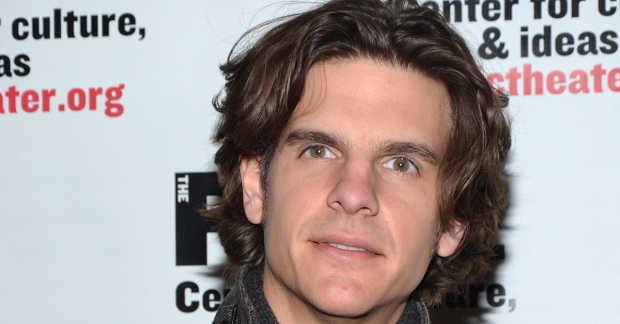
(© David Gordon)
Though Corbusier's mission to create "aggressively visceral theater combining historical revisionism, multimedia excess, found texts, sophomoric humor, and rigorous academic research," Timbers created a children's pageant out of the work of L. Ron Hubbard, turned Robert Moses into a " messianic figure who can turn water into reenforced concrete," and eventually, brought out the emo side of President Andrew Jackson.
In the ensuing years, he brought Pee-Wee Herman to stage, turned Imelda Marcos into a disco diva (Here Lies Love), musicalized Shakespeare (Love's Labour's Lost), forged a long working partnership with comedians Nick Kroll and John Mulaney (Oh, Hello on Broadway), made Beetlejuice sing, and, most recently, staged Baz Luhrmann's Moulin Rouge! as a thrilling Broadway spectacle. And that's just a partial listing of his résumé.
Moulin Rouge!, based on the Baz Luhrmann film, marks Timbers's third Tony nomination, his first for Best Director of a Musical. The production, Timbers notes, is a synthesis of all the styles he loves — a blend of pop, period, and politics — and takes the best elements from the Corbusier playbook — historical revisionism, multimedia excess, and rigorous research.
But, to play on a lyric of his longtime collaborator David Byrne, "How did he get here?"
Let's see.
The following conversations have been condensed and edited for clarity.
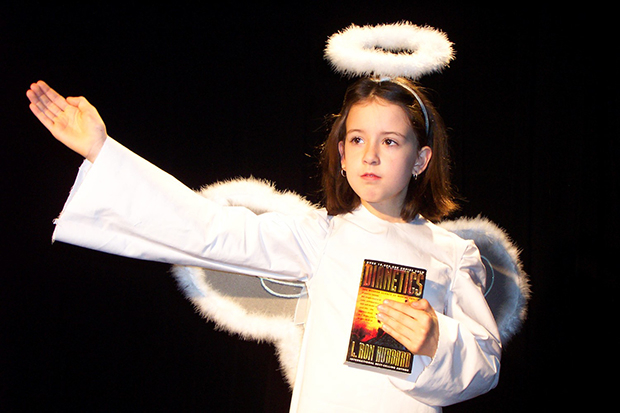
(image via alex-timbers.squarespace.com)
A Very Merry Unauthorized Children's Scientology Pageant (2003)
with a mention of Jersey Boys (2005)
A one-act musical about the life of L. Ron Hubbard and the creation of the Church of Scientology, Pageant was directed by Timbers and written by his early collaborator and former college classmate, Kyle Jarrow. It ran first at the Tank Theatre, and then transferred for three weeks to the John Houseman Theatre.
Alex Timbers: My first reviewed show was written with Kyle, called President Harding Is a Rock Star. Right after that was Scientology Pageant. When you look back on some of the reviews, they were like, "Who are these people? We like this show, but we have no idea if they know what they did." Like, "I'm not sure, but they might think we're idiots." It was based on the experience of those, and a show I did about Robert Moses, that I got a Drama League fellowship in 2005, where I assisted Des McAnuff on Jersey Boys, which was my first look at working on a show where people received a weekly salary. I worked for free. But it was amazing.
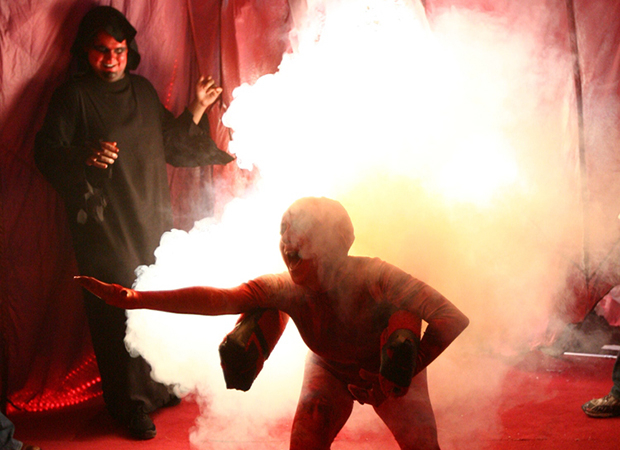
(© Joan Marcus)
Hell House (2006)
with a mention of Boozy: The Life, Death, and Subsequent Vilification of Le Corbusier, and, More Importantly, Robert Moses (2005)
Directed by Timbers and "updated" with Alexis Soloski, Hell House ran at St. Ann's Warehouse and was a re-creation of the haunted-house attractions presented every Halloween season by evangelical churches across the country that depict acts the organizers deem sinful.
Alex: Les Frerers Corbusier was interested in this Brechtian notion of "negative argument." If you're doing a show about Robert Moses and the destruction he wreaked in New York City, and you say "Robert Moses was a bad guy," that's just confirmation. We thought it would be a much more damning critique if people see what they're doing, so let's make Robert Moses a messianic figure who can turn water into reenforced concrete.
Hell House was a provocative piece of theater, but it didn't really come from a provocative place, and I don't think of myself as a provocateur. It really came from feeling like there was a huge gap between the blue states and red states in our country.
We wanted people to experience these Hell Houses in a way that felt authentic and not parody, so we reached out to Pastor Keenan Roberts, who is the guy in Colorado Springs who writes the annual script and issues the sound effects CD and the props book that tells you how to make a fetus out of hamburger meat and stuff like that. We asked him to help us re-create it authentically, saying to him, "We don't agree with your politics and we don't think we're going to convert a single person, but we want to make sure this is not just a bunch of liberals shooting arrows." And he was like "OK, let's do it."
It was more of an intellectual engagement than pushing buttons. It was making the audience lean forward and actually engage with the questions we were posing.
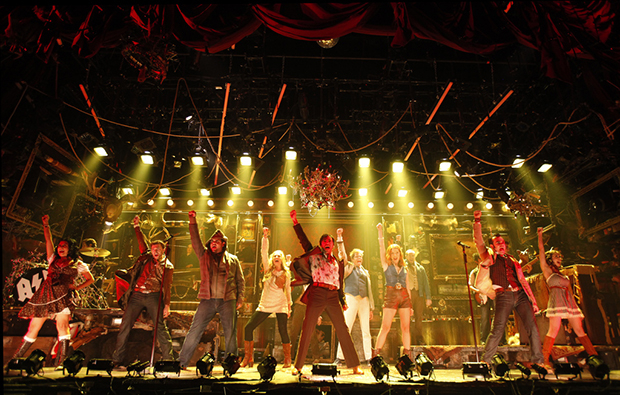
(© Joan Marcus)
Bloody Bloody Andrew Jackson (2008-10)
The first collaboration of Timbers and songwriter Michael Friedman, Bloody Bloody Andrew Jackson recast America's seventh president as an emo rock star. It was developed at Williamstown Theatre Festival and opened off-Broadway at the Public Theatre in 2009. Its 2010 Broadway transfer marked Timbers' Broadway debut, and he earned his first Tony nomination for the musical's book.
Alex: Kurt Deutsch set Michael and I up on a creative blind date. I was really interested in emo music and that edge between sincerity and irony, and he said, "You're really interested in historical figures, too, and in a way, Andrew Jackson was the ultimate emo president." And I was like, That.
Even though I was the quote-unquote book writer, this was one of those shows where it was helpful having worked in downtown theater, where there was no preciousness. All of the best stuff in the show came from other people, whether it was Greg Hildreth or Ben Walker pitching a joke, or Donyale Werle's weird set elements. It was a true hivemind kind of creation.
We did a lot of work on the show from off-Broadway to Broadway, and I always slightly bristle when people say it was better at the Public, because the actual craftsmanship was definitely better on Broadway. We had a sense as soon as a transfer was talked about that it wouldn't work commercially, but it was important for the life and legacy of the show to have a Broadway run.
One of the things it had going against it was, it's a satire. You want to feel something in a profound way when you see a musical on Broadway, and Andrew Jackson makes you feel complicit and complicated about your role in American history. That's the goal. We were trying to get a very nontraditional emotional reaction, and that works well off-Broadway, but when you're paying $120, maybe you're looking for a different experience, and I think that's fair. I don't criticize the show for that, and I don't criticize the audiences. It's part of the pact.
Michael [who died at 41 in 2017] was three years older than me, and he kept reminding us that he was the oldest person working on the show. I always felt lucky to work with him, but even years later, I always felt that he was the adult, and I was the kid at his knee lapping up all I could learn from him.
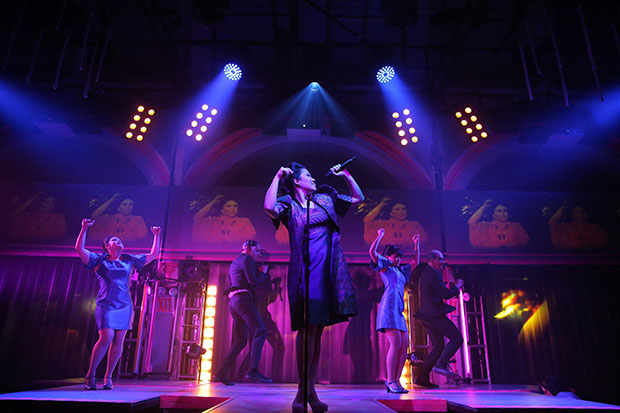
(© Joan Marcus)
Here Lies Love (2013-17)
Rocky the Musical (2012-14)
Here Lies Love is a semibiographical disco musical about former Philippine first lady Imelda Marcos. Written by David Byrne and Fatboy Slim, it premiered at the Public Theatre in the summer of 2013. Rocky the Musical, written by Thomas Meehan, Sylvester Stallone, Lynn Ahrens, and Stephen Flaherty, premiered in Germany in 2012 and opened on Broadway in 2014.
Alex: Both Rocky and Here Lies Love were developed at the same time, and with the same thinking. With Rocky, it was "How do we go from proscenium to in-the-round," and with Here Lies Love, it was the reverse.
Here Lies Love was the single greatest theater experience I've ever had in my life. Working on that show with David and Annie-B Parson and the designers and that incredible cast, and the process of going from NYU to PS122 to Mass Moca to the Public felt very satisfying. We had our dress rehearsal at the Public on a Sunday, and someone came up to me on Monday and said "You know, Alex, not all projects work." I spent 24 hours thinking they all thought it was terrible, and then we had our first preview, and it was transformative. That show was a great risk, and everyone was really on their a-game.
Tom Meehan and Sylvester Stallone were the start of Rocky. Stallone found Tom. Tom would tell these great stories, where he and Stallone would go to Chicago and meet with potential [famous] songwriters, and everyone would be in fatigues at the recording studio and all the lights were off, and it was smoky. It was so atmospheric and wild. Then Tom suggested they meet with musical-theater writers and they hooked up with Lynn and Steve. I came on many years after that piece had been fully written, so I didn't have a lot of interaction with Stallone, but he was super cool, and he is a brilliant, wildly clever person. He came to Germany and had some really good and smart notes about the performances of Rocky and Adrian. He is deeply and emotionally connected to that show.
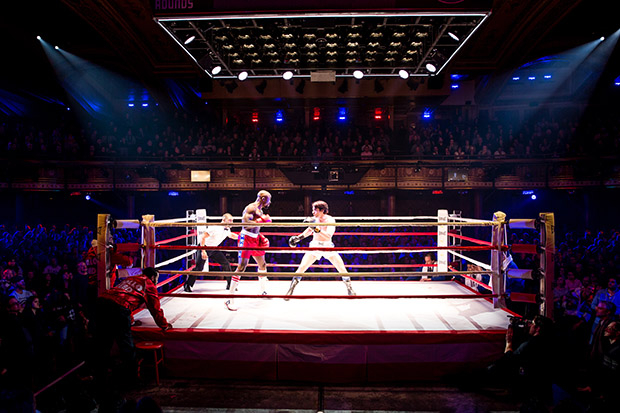
(© Matthew Murphy)
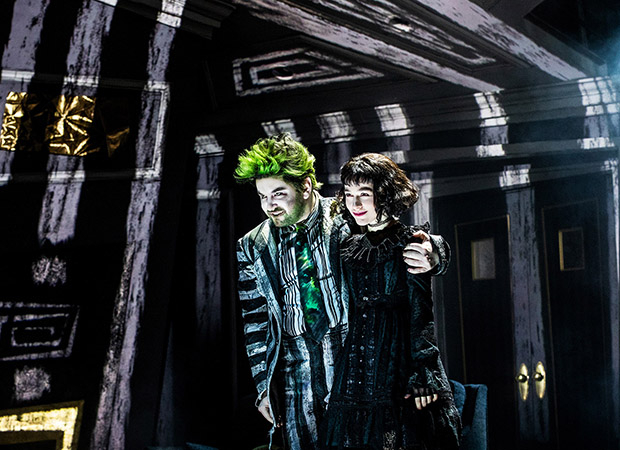
(© Matthew Murphy)
Beetlejuice (2018-present)
An adaptation of the Tim Burton film, Beetlejuice was running at the Winter Garden Theatre at the time of the Covid-19 shutdown. It has a score by Eddie Perfect and a book by Scott Brown and Anthony King.
Alex: I've worked on a lot of shows, but I've never had a show where the audience was as engaged as they were on Beetlejuice. When we got to the end of Bloody Bloody Andrew Jackson, we were so sad it was closing and that it didn't connect with the audience. Whereas, when Beetlejuice shut down, we were firing on all cylinders. The audience was creating art around the piece. They were excited to create their own toy version of the Beetlejuice house, and film themselves performing the entire show with their friends. To know that something impacted people in such a profound way has been really cool to experience. I feel really inspired by that.
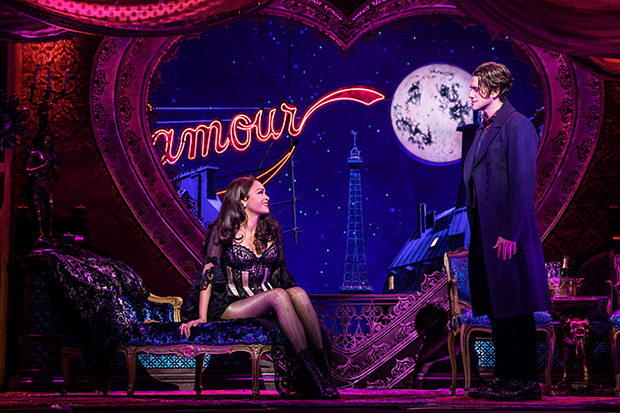
(© Matthew Murphy)
Moulin Rouge! (2018-present)
An adaptation of the Baz Luhrmann film, Moulin Rouge! is a tragic love story set in fin de siècle Paris, set to contemporary pop songs. The production was running at the Al Hirschfeld Theatre at the time of the Covid-19 shutdown, and is currently nominated for 14 Tony Awards, including Best Musical and Best Director for Timbers.
Alex: When you look at shows like Hell House or Bloody Bloody Andrew Jackson, my curiosity has always been how to create an experience before the curtain goes up. Your ticket is ripped and you're entering a whole new world. Moulin Rouge! really avails itself of that opportunity.
One of the things I loved about Cabaret at Studio 54 was that it felt so dangerous because there was no division between the footlights and the audience. There's something really wonderful and empowering for an actor in a preshow to look at the audience in the eye and acknowledge them. The actors in Moulin Rouge! are virtuosic and they make difficult things seem effortless, but they are having a wonderful time.
The theater company I founded in 2003 was about the collision of history and today, and how you can tell historical stories that are both contemporary and resonant. That mash-up is the key to what Baz Luhrmann was doing in the film, and the idea of the collision of pop, period and politics, that's Here Lies Love, that's Bloody Bloody Andrew Jackson, that's Moulin Rouge!
I felt so excited to work on it because it's the crystallization of all the things I love in one piece.







